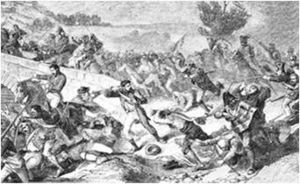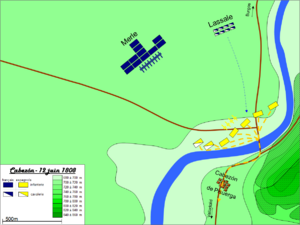Battle of Cabezón facts for kids
Quick facts for kids Battle of Cabezón |
|||||||
|---|---|---|---|---|---|---|---|
| Part of the Peninsular War | |||||||
 Flight of the Spanish at the Cabezon bridge |
|||||||
|
|||||||
| Belligerents | |||||||
| Commanders and leaders | |||||||
| Cuesta | Bessières Lasalle Merle |
||||||
| Strength | |||||||
| 300 regular cavalry 4,700 militia 4 guns Total: 5,000 |
9,000 regulars | ||||||
| Casualties and losses | |||||||
| 1000 dead | 50 dead/12 killed, 30 wounded | ||||||
The Battle of Cabezón was an important fight during the Peninsular War. It happened on June 12, 1808, near Valladolid, Spain. Spanish soldiers, led by General Cuesta, fought against French forces. The French army was commanded by Marshal Bessières, with generals Lasalle and Merle leading parts of it. The battle was a quick and clear victory for the French.
Contents
The Armies and Their Leaders
The Spanish army, called the Army of Castile, was led by General Gregorio de la Cuesta. His force had about 5,000 soldiers. Most of these were volunteers who had only been training for about two weeks. They were not experienced fighters. Cuesta's only skilled troops were 300 cavalry (soldiers on horseback). He also had four cannons.
The French army was much stronger and more experienced. It had about 9,000 regular soldiers. General Lasalle led four battalions (groups of soldiers) and two regiments of chasseurs (light cavalry). General Merle commanded six battalions and two squadrons (smaller groups of cavalry).
Where the Battle Happened
The battle took place at the bridge of Cabezon. This bridge crosses the Pisuerga river. It was a key spot on the main road from Burgos to Valladolid.
General Cuesta made a risky choice. Instead of defending the bridge, he moved his inexperienced soldiers across it. This put the river at their backs, making it hard to retreat.
The Battle Begins
On June 12, General Lasalle's French troops quickly attacked. They charged the Spanish lines. The Spanish soldiers, who were mostly new recruits, tried to hold their ground. They fought for about 30 minutes.
However, the French attack was too strong. The Spanish cavalry, which was supposed to be their best unit, quickly ran away. The rest of the Spanish infantry (foot soldiers) broke apart and fled.
French Victory and Aftermath
The French quickly captured the bridge and the Spanish cannons. Many Spanish soldiers were killed or drowned in the river while trying to escape. About 1,000 Spanish soldiers died, and 4,000 muskets were left behind.
General Cuesta escaped with the remaining soldiers and retreated to Leon. The French, led by General Lasalle, entered Valladolid later that evening without any more fighting. The battle was a big win for the French, costing them only 12 killed and 30 wounded.
This battle was an early event in the Peninsular War. After this, the war continued with both guerilla warfare (small, unofficial groups fighting) and conventional battles (large, organized army fights). The Battles of El Bruch were another early example of Spanish conventional warfare.
See also
 In Spanish: Batalla de Cabezón para niños
In Spanish: Batalla de Cabezón para niños
 | Jackie Robinson |
 | Jack Johnson |
 | Althea Gibson |
 | Arthur Ashe |
 | Muhammad Ali |


